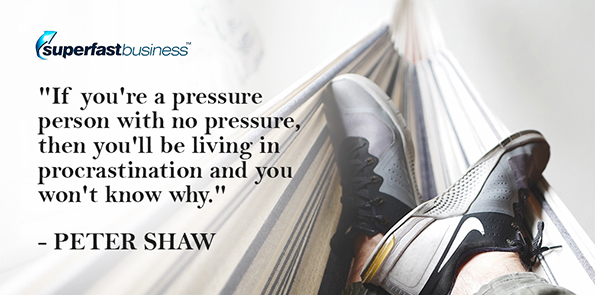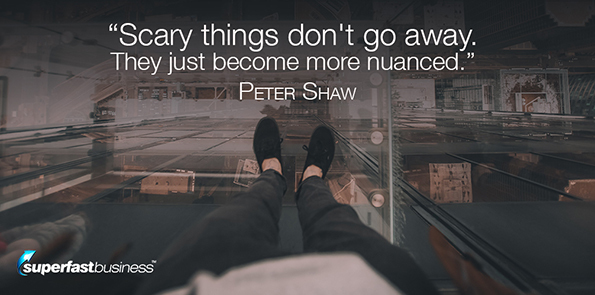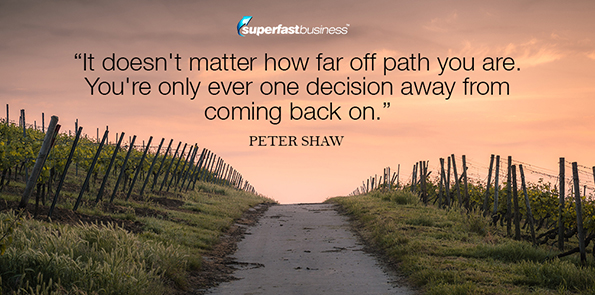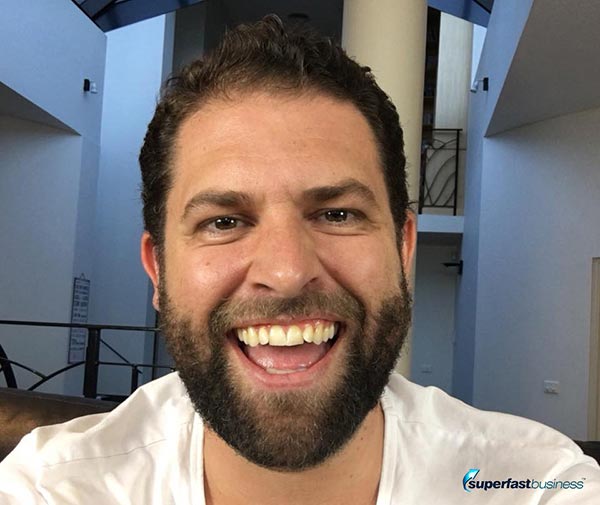Peter Shaw teaches a unique brand of neuro linguistic programming (NLP), one that encourages his students to do what’s “scary and exciting”.
In this SuperFastBusiness interview, Peter shares what this philosophy has done for him personally, how he arrived at his version of NLP, and some insightful observations on human nature and achieving change.
Podcast: Download (Duration: 38:06 — 35.0MB)
Get Notified Of Future Episodes Apple Podcasts | Spotify | Amazon Music | Android | Blubrry | Gaana | TuneIn | Deezer | Anghami | RSS | More
In the interview:
01:13 – Meeting Pete
02:49 – From natural academic to NLP guide
04:17 – Why Peter once had no house
06:05 – Skydiving, anchors and surfing
08:39 – Emails you’ll actually read
11:23 – To not be just another expert
13:58 – Delivering what’s missing in NLP
17:03 – A matter of craftsmanship
19:02 – The challenge of simplifying
21:37 – What excites a thinking man’s thinker?
22:55 – What happens to the scary stuff
24:23 – Embracing the things that polarize
27:46 – The courage to be responsible
30:53 – Having that conscious control
34:29 – Why athletes make great business owners
James will help change your life and business by changing your mindset
Transcription:
James: James Schramko here. Welcome back to SuperFastBusiness.com. This is Episode 754. And we are going to be talking about scary and exciting stuff with Pete Shaw. Welcome to the podcast.
Peter: Thank you very much. 754 is my lucky number.
James: It is? It’s mine, too. Today. What a coincidence.
We’ve had a long association. I just want to fill in a little bit of the story about how we met and our interactions in between, because it sort of explains where things are at for you now.
Meeting Pete
Way back in the day, when I’d quit my job and I was invited to speak at some events. I kind of enjoyed it. I liked educating the audience, and I sold a few workshops from stage, and I created information products in the form of DVDs.
And one of the promoters at the time invited me to speak on their platform, and they also ran training for NLP. And because I was speaking on their platform and because they wanted to maximize my success, they sent me along to some advanced speaker training.
And I think that’s where I met you, Pete. Or if I met you before, then it’s definitely where I really got to know you. You were a top-flight educator in that field of mindset brainiac stuff, and sharpening up our skills as presenters and speakers. And since then, I’ve bumped into you several times, and I’ve observed what you’ve been doing on social media.
You’ve built a whole brand around scary and exciting. You’ve got a website, ScaryandExciting.com. You’re active on Instagram. You’ve got an email list, which is terrific, where you send out some incredible insights, and it’s one of the few emails that I actually will go and read. I read very few emails, unless it’s a surf photographer, and I think I might have been photographed that morning.
It’s one of the only business content that I look at. Because I think mindset is just so critical. And I’m sure it’s at least a quarter of what I’m talking to my students about. But you’ve just taken it full on, and you’re a legend at it. So why don’t you give us the rundown from your side of it? What’s been your story?
Peter: Or the story from the beginning?
James: Yeah. You were born…
From natural academic to NLP guide
Peter: I was born. I had a wonderful childhood. And then I got pushed down this path of, you know, I was naturally good at school, I was built for the school system. And not everyone is and so they split us into smart people and dumb people, which is very unfair. And I became fascinated by this ability to learn, and I was interested in accelerated learning. And I, to my great horror, I discovered that I wasn’t smarter than other people. Just in that system I was, and I was built for that.
And so I then got interested in hypnosis, which led to neuro linguistic programming. And this was all based on peak performance. And I was searching for the difference that makes a difference in people. And that took many years to sort that out. But then as you get further and further into peak performance, it becomes more about your unique code and how that relates to the world around you. So it’s very personalized genius. I guess.
James: I was split into the dumb side. According to my school results, I’m not smart. You know, I failed my high school certificate, much to the disappointment of my parents, because it was a pretty expensive school. I was just coasting. And apparently I had ADD. They prescribed some Ritalin, it rapidly improved my results.
But I’d missed the building blocks. And I learned a different way. Obviously, I’ve landed on my feet, for someone who’s not a classic academic.
Why Peter once had no house
You’ve also done a lot of experimentation. I’m having flashbacks here that you used to have no formal abode at some point.
Peter: That’s right. I went four years…
James: That’s really maybe even my first memory of you, was when I travelled to London.
Peter: Four years, full-time travel.
James: Yeah, you had no house, you didn’t live anywhere in particular. Tell us about that. That was really interesting.
Peter: So I was teaching NLP for a number of years. And then I had this phrase that I kept saying to every single class, which was, if it’s scary and exciting, do it. And I used that for sales. And I used that for life direction. Because the NLP tools are wonderful, but they have no context. And they require a direction to go down. And so I found that after teaching these people peak performance tools they were still asking, sure, but which way do I face?
“Scary implies growth.”
And so I was saying this phrase, “If it’s scary and exciting, do it.” Scary because that implies growth, and exciting because (and long-burn excitement, not not short 15 seconds of self-gratification, but long-burn excitement.)
And so I’d done this series of things for myself, where I was terrified of heights, so I jumped out of a plane. I was scared of public speaking, so I went and did a public-speaking training and then just hung around places where I had opportunities to speak as much as possible.
And then the final one, that was, I’d never traveled. So I booked a one-way ticket. And by the time I left, I had $100. I left Australia with 100 bucks and no plan at all. And it was the most glorious thing that I could have done. But all these things came back to pay these huge dividends in overcoming those fears. Because it’s scary and exciting to become that person. So it’s not about skydiving, it’s becoming the type of person who is willing to do that thing.
Skydiving, anchors and surfing
James: I can relate to this because I was petrified of skydiving. When we were flying up in the plane. I was thinking to myself, what kind of idiot thought this is a great idea, like, who invented it? Who’s like, Oh, I’m going to just jump out of a plane? And then someone said, I think it was Leonardo da Vinci. You know, he was drawing pictures of people with wing devices, etc. You know, imagine the first people doing that, the pioneers.
Peter: But the stories are fabulous, from the 1600s through to until we had powered flight, of people trying to fly by strapping various apparatus to themselves and jumping off buildings and cliffs. None of them made it. But they were very, very brave.
James: Right. So, really interesting. So when I did do it, I did notice a transformation. And I combined that with a technique that I’d learned where you can create anchors. And I would hold one of my fingers to my thumb and remember when I went skydiving. And the other anchor that I had was on the other hand, I held my finger and my thumb, and I remembered when I was up receiving my award for being the top salesperson at Mercedes-Benz, looking out at the whole room knowing that I was number one.
And when I combine them, I’m like, absolutely unbeatable, because I’m a skydiving high-performance winner. And that allowed me to be the person I needed to be to achieve things that would normally throw people off.
I like the scary part, because that really relates to something – in fact In the episode just before this, 753, I was talking with Rachel Pedersen, and she mentioned Joseph Campbell’s philosophy of the cave with all the treasures in it. You know, the cave that scares you the most is where you’ll find your treasures.
Peter: Yeah.
“It’s the excitement factor that gets you through.”
James: That sounds a lot like the scary part. And the exciting part, that’ll be one heck of a domain name, wouldn’t it? Scary and long-burn exciting. I’m glad you abbreviated. I think the excitement part is what gives you the motivation to get through all the inevitable obstacles in that journey. There will be so many trials and enemies and bosses for you to defeat on that journey. It’s the excitement factor that gets you through it.
When I think about that, for me, it’s my surfing. On my journey to being a reasonably mediocre, half-decent surfer, I had to break ribs, I got held under, I hit reefs, I’ve had stitches, I’ve broken a board. There’s so many challenges in that journey. But the rich reward of colliding into a wave and having that wave arc up and being right underneath it is just incredible, beyond words.
Emails you’ll actually read
So we’ve intersected in our lives. I’m constantly drawn to your alternative viewpoints, your controversial emails. You send out high-quality emails that are self-contained value, which is rare. Most people are just pitchy, pitchy. And by all means, you’ve got a call to action in your emails, because you do need to actually make a living. How long do you spend formulating your Super Six?
Peter: So I’m a pressure performer in my unique code. And so I started the Super Six, which comes out roughly every Wednesday because I needed to lock myself into something. And I knew there was goodness inside of me, but I was having trouble extracting it. And so I promised it so that I would have a deadline and people that were waiting for it.
And that’s how the first couple came out. And then it became a regular thing where if I happened to not send it one week, people would say, Hey, where’s my email?
James: Yeah.
Peter: And that’s been glorious, because there’s 218 weeks’ worth of that now, about 130,000 words, which is roughly three or so books’ worth of content. But this is how I needed to extract it out of myself. So I write little thoughts and notes in my phone during the week, but coming up on Wednesday, I’m like oh, okay, and I let the pressure build, and then I sit down and write it in one go.
And that just takes as long as it takes, I think the fastest I’ve ever done it would be half an hour or 45 minutes. And the longest it’s taken is about six hours. But for me – and all the pressure performers out there listening to this can relate to this – the words formulate inside me as the deadline approaches. And so even though I sit down and write it one time, I’ve written it and rewritten it 50 times in my head.
And for the people who are not pressure performers, the opposite end of the spectrum, they’d be much better off just writing whenever they’re feeling the writing. And so every person in their unique code needs to do things in a different way.
James: Thank you for explaining that. I do deliver a live training each month in SuperFastBusiness. And I usually think about what the topic might be, and it’s usually related to the conversations happening within my community and my coaching calls. And I’ll generally open up a keynote, and I might chip away by adding a few bits and pieces, a bullet point here or there to a framework.
But I definitely surf on it, and I think about it, and I usually produce it the day before. And then I’ll just do a final rendering on the day, and deliver it. And then it’s recorded and captured and then it’s redistributed to members and then sold separately at SuperFastResults.com. So I’ve got the whole machine. What do you plan to do with your archive?
Peter: Well, the most important thing was to bank it first.
James: Yeah.
To not be just another expert
Peter: It was to get it out there and recorded. I was naturally resistant to writing a book during that phase that you and I are both very familiar with, the wanker phase of personal development, where everyone came out to be the world’s number one expert in something.
James: Yeah.
Peter: And I didn’t want to be in that mix. I only ever want to put out things that I’m proud of. And I didn’t want to get lost in the noise of everyone being the expert at something. So we have a number of books ready to go, and just waiting for that timing to be right where I can put it out and it be a solid, proper book. Remember proper books?
James: Yeah, I do. And I’m watching my book, Work Less Make More.
Peter: Yes.
James: You know, it’s a couple of years old, and it’s selling now. Some days it sells hundreds of copies and book shops are starting to order it. I was reading about Cialdini’s Influence. It didn’t take off till years after it was published. It only became famous years later.
I wanted to publish a proper book. And I had two gos at it. It took me five years and like, tens of thousands of dollars’ investment to make a book that I could proudly give to my kid and say, Look what your daddy made, and feel like it’s not a pamphlet, these little throwaway books.
I don’t like those little marketing tools. They describe the person making it as well as what it is. So, you know, like, I’m working on two books right now. But just like you, I’ve saved up my powder. You know, I’ve been running membership sites since 2008. And I’m now doing a book on memberships in 2020.
Peter: We talked about this, like, 12 years ago or whenever it was, that the good content is evergreen and will last forever.
James: Yes.
Peter: And we were watching people come and go. Some people lasted six months, and some people made it through six years, but there’s only a few people still standing, which is amazing. Because that good stuff has lasted the test of time.
James: One of my mentors drummed into me the concept of making Grange. And for our overseas listeners, Grange is a high-quality red wine in Australia. And it was made in secret for a while. The guy who made it, he was making some, submitted it to the owner of the winery, Penfolds, and they said, stop making that, Max. And he kept making it and refining it.
And then he entered it into a competition and it won. And then they said, Hey, did you keep making that stuff, Max? And then he’s like, Yes, actually, I did. And now it can sell for, you know, $800 for a bottle of wine. And it takes a while to make. You know, it’s not Ribena or it’s not grape juice. You got to go through a process.
Delivering what’s missing in NLP
And what I’m seeing with you, Pete is an amazing iteration of yourself and doing something that was missing in that world. The thing that confounded me about the NLP world – and I’m sure I’ll be upsetting some feathers here.
Peter: Yeah.
James: It produced quite a lot of nut cases.
Peter: True.
James: They went into their searching and looking. And they got their toolkit, and now they thought they had the toolkit to everything. And they kept going to the next event and the next one and that was just as scattered as ever. But scattered, but minus their payments for the education.
But what you’re doing is, you’re breaking this stuff down into everyday language and making it super consumable, but also very impactful. And I can’t help but notice all the praise and testimony going through your social media right now with the people you’ve been working with in groups, and you’re working with some pretty high level coaches, from what I can tell.
Peter: Yeah, it’s a focus thing. When I came to NLP and I sat in my first class, there were 22 people in that class. And without putting too fine a point of it, you had 21 people who had turned up because they had problems and issues that they wanted to resolve for themselves, and you had me who was interested in peak performance.
And so I received NLP, it’s the original study, it’s modeling excellence.
James: Yes.
Peter: And distilling that from a chosen role model and then installing it in yourself so that you can replicate that result.
“NLP should represent excellence.”
Unfortunately, somewhere along the way, NLP went down this therapy route. Now, it’s amazing for therapy, by the way. However, it got pigeonholed and made smaller. NLP should represent excellence, and for most people, it represents clearing out beliefs from the past.
James: Yep.
Peter: And what that means is that as most people learn it, they’re only learning that sort of therapy side of NLP and they’re missing the modeling bit and the excellence bit. And that’s the best bit, the generative side of it.
And so when I do the NLP training or work with people, I always want to bring both sides of that equation together. So you can clear out any baggage you’ve got from the past, but the second you do that, you have to be facing forward and using those anchoring techniques that you were talking about before, using peak performance visualization, installing new strategies, useful beliefs.
 And then the bit that I guess I’m adding on top is the unique code and the hinging points, which is what your vehicle is exactly, and how to best drive it. Because a Ferrari is really cool, but it can’t go on a four-wheel-drive track.
And then the bit that I guess I’m adding on top is the unique code and the hinging points, which is what your vehicle is exactly, and how to best drive it. Because a Ferrari is really cool, but it can’t go on a four-wheel-drive track.
James: Well, you know, coming from Mercedes-Benz and seeing a lot of AMG owners, they had the hardware, but a lot of them couldn’t drive very well. They actually banned the staff from competing in the drive days because we would flog the customers. Like if there were 10 positions, we’d get the top seven, and then the rich customer who couldn’t drive for crap would come in last, and it would embarrass them. So they didn’t log our times after a while.
A matter of craftsmanship
And so yeah, you got to be able to use it. I do love the visioning. I do love the anchors. One thing I got from it was going back to the original research and finding Milton Erickson and learning more about that process that he went through where he would fully research and understand the situation to be able to prescribe the right solution. And I think he used to write it by hand, and he was said to be able to solve things in one sitting.
And as a coach, that’s my perfection. If I can take someone’s scenario, fully understand it, and use all the tools at my disposal to help them arrive at the result that would be perfect for them with the minimum amount of effort, that’s the result I’m looking for.
Peter: That’s right. And that’s the difference. There’s a renaissance at the moment of artisan and craftsmanship. And when you do that…
James: You’re not just talking about deconstructed food at a cafe, right? You get charged more to build your own sandwich. Or tip your milk into your espresso.
Peter: A genuine craftsmanship and part of that is serving your apprenticeship.
James: Yeah. I get you.
Peter: And not being in a hurry. Instead, like you said, sitting in things for long enough to truly be a craftsman or craftsperson. I guess it’s more politically correct, but it doesn’t sound quite as cool. And so, yes. And I really took time to build that craftsmanship. That’s why I’m very slow on doing things and bringing things forwards. But I like it. I really like this approach to the world where things don’t have to be in a hurry.
And then the important piece is, like, you’ve got SuperFastBusiness, which implies going fast. But the way you go fast is to go deep, to understand things truly. And so when I talk to people who are James Schramko fans, which is quite often, they’re always talking about this just so much, and I immerse myself in it.
The challenge of simplifying
James: Yeah. Like, it’s been a challenge. When you have a consistent business for many years, you do create a large body of work, there’s no doubt about that. I’ve been generating at a prolific rate. So the biggest challenge is, okay, I’ve created a supermarket. And the biggest challenge is to make sure you label the aisles clearly.
And hand out recipes, right? You come in here, grab the basket. If you want to cook pasta tonight, then I’m going to show you where you can get the pasta, and the tomatoes and the garlic and the onions. And then you get the hell out of here. You know, you don’t need the pet food or the nappies – leave that for someone else. They got a different problem.
So that has been a challenge, is to simplify, which is why the latest product I created is the simplest product I’ve ever created. I opened up a community where they pay a monthly fee of $10, and the service is they ask a question and we answer it.
Peter: Yeah, that’s amazing.
James: That’s it. There’s zero content, zero extra training, zero gigabytes of downloads, nothing else. It’s you ask a question, you get an answer, and it’s 10 bucks a month. It’s at SuperFastResults. And that was my attempt to do something simple and to make it easy for someone. It’s a very low barrier to entry, and they get all their problems solved.
So it’s been a fun experiment. And it’s nice to be able to innovate and still come up with new things. And to stay in tune with the market. And I see you do that well.
And I like, the thing that’s going on at the moment in the world is we have an opportunity to slow down. We’re not traveling as much. We’re spending more time at home, we can clear out the garage, we can paint the walls, we can get rid of old things from our life, we can reflect on what the next phase is going to look like, as we have this sort of pause or this rest period, for some.
For others like me, it’s like, trying not to be too busy, because there’s so much opportunity, it’s ridiculous. And for anyone who’s a knowledge worker, like Peter Drucker talked about, who is able to work from a phone and an internet, like unbelievable time. This is actually the least travel I’ve done in the last decade. And the routine I’ve built is so strong.
I’ve got so much time to think and plan, and that’s why you just keep popping up in my life more and more. Because when I think of thinking, I think of Pete, because you’re a thinking man’s thinker.
Peter: I definitely do a lot of thinking. But behind the scenes, that’s my job. And on my calendar, there’s a lot of blocked-out thinking time, which is just for me to ruminate on things. So I guess that’s my actual job. And then the second bit is then delivering that back out into the world.
What excites a thinking man’s thinker?
James: What are you most excited about?
Pete: I get excited by people who have the willingness to move forward, and then I can help them and I can go on a journey with them, where for some people, it’s they’ve got all the stuff that they need, and they just need to get the strategy right, and I can help them with the strategy.
 For some people, they’ve got the strategy, but they’re missing the hinging points. And these make a huge difference. If you’re a pressure person with no pressure, then you’ll be living in procrastination and you won’t know why. Because no one likes pressure, but under pressure, they will fire on all cylinders. So the question is, how can we get that pressure into that person’s life at the appropriate level?
For some people, they’ve got the strategy, but they’re missing the hinging points. And these make a huge difference. If you’re a pressure person with no pressure, then you’ll be living in procrastination and you won’t know why. Because no one likes pressure, but under pressure, they will fire on all cylinders. So the question is, how can we get that pressure into that person’s life at the appropriate level?
And then some people are the opposite. They need me time, they need downtime. They need meditation time. From this conversation, it sounds like your hinging points are having that really good solid routine, having a vision of how you’re going to help people.
And surfing has, of course, been this incredible focal point for you. And my guess is that it’s the culmination of a couple of hinging points of having downtime and me time, but you’re a very active kind of guy, so doing that in an active way that’s also skill-based.
James: Right. That does make sense.
What happens to the scary stuff
What scares you? Because you’ve addressed some of your scary things. And I wonder, do you continually have scary things? Or do you just reach a point where you’ve fortified your mind to just instantly deal with it?
Peter: Two things happen. You get better at dealing with scary things. So the world does become less scary over time. That willingness to go outside the comfort zone, if you can train that, then things become less scary. You become more robust and able to handle things.
 But scary things don’t go away. They just become more nuanced. And you’ve got to be very careful on a scary and exciting journey. You don’t just go down for the stuff that you like, and ignore. So if you’ve got scary stuff in relationships, but you ignore that, then at some point, you’re going to have to turn around and face it and it will look very large.
But scary things don’t go away. They just become more nuanced. And you’ve got to be very careful on a scary and exciting journey. You don’t just go down for the stuff that you like, and ignore. So if you’ve got scary stuff in relationships, but you ignore that, then at some point, you’re going to have to turn around and face it and it will look very large.
So trying to pursue the scary and exciting that’s in front of you, but over time, make sure that you don’t miss any area of your life. So for me, the scary things are more nuanced now. Some of them are in business, building new platforms and programs. Some of them have been facilitated by the Super Six, speaking my mind on very difficult topics and putting that out there.
Because in the past, I was very, very adverse to controversy. And I didn’t ever want to be confrontational with anything. And so that’s been one that has been chipped away in many different ways over the years, to the point where now I’m well-known for being controversial and confrontational.
Embracing the things that polarize
James: It is interesting. And I think that draws people to you, and it’s going to repel people from you.
Peter: Yes. I love that polarization.
James: Yeah.
Peter: On my social media, and in my email group, I’m very clear that I only want to speak to my people. And so if a person is, you know, if we’re in the same direction at the moment, then let’s take this ride together. But if a person sees me or my content and goes, aw, not into that, then then don’t be into it. That’s totally fine. Go and find whoever you’re meant to hook up with right now.
“You’ve got to stand for something.”
James: I follow the lovely Sorelle Amore on social media. I was going through her Instagram course. And she said You’ve got to stand for something. And she does. If you follow her, you’ll see she definitely takes a stand, and you can decide where you sit with that. And she’s got a massive following on YouTube and on Instagram.
And she’s a lovely person. I’ve had the pleasure of speaking to her several times. Her training is great as well. But that was something she was very clear on, you have to stand for something.
I know I’ve been pretty firm in my sort of willingness to say what other people want to say but can’t, and that’s one thing. In my whole time online, I’ve reduced compromise as much as possible. I’m not beholden to a promoter or an employee. I can really say what I think and what I feel and not be too concerned about losing some reciprocity.
Peter: Yes.
James: A lot of people are really bound by something, which is unfortunate, because you end up with an echo chamber and groupthink, or just being quiet and building up a lot of toxin and challenge within themselves that they can’t address.
Peter: When I go to speak at various stages, sometimes they’ll have a request. And they’ll say, a very common one, Peter, can you please not swear for this audience? And for me, that’s fine. And I go and deliver the message and do my very best with the swearing thing. And that’s fine. But if there’s two requests, I’m out of there. If there’s, Hey, can you just not say this or mention this, and they’re trying to change the message, then I can’t speak there,
James: Because you’re being weaponized.
Peter: Yeah. And I had an extraordinary scenario a number of years ago now, where they came to me and they said, you know, they were turning over more than eight figures every single year, and they said, We want you to be the face of this company. Here’s the content we want you to deliver. And it was all that wealth-based nonsense content.
James: Yeah.
Peter: And they said, here’s how much we’re going to pay you. You’ll need to work for the next three years of your life, and then you can retire forever.
And I didn’t even think of that. I said, No. I will not deliver rubbish content. It doesn’t matter. I think a lot of people have that in theory, that they want to be true to themselves no matter how much they’re being paid, but I actually got put in that position and it took less than 30 seconds for that to be a no.
James: I was offered more from a buyer of my SEO business, from a company who wanted to acquire my customers and my intellectual property, but would have let my team of 38 people go, because they already had a team.
Peter: Yeah.
“The short term win is not worth living with if you’re letting yourself down.”
James: I instantly said no, it was not going to happen. And I went and found a buyer who paid less, who would employ every single one of those people. You know, the short term win is not worth living with if you’re letting yourself down. And we really should hold ourselves accountable.
The courage to be responsible
Like, I think there’s this massive relationship between responsibility and the levels you’re going to achieve in life – the levels of happiness, the levels of success, the levels of accomplishment. It’s tied back to responsibility.
I bet you when you’re consulting, you find people who have detached themselves from responsibility to some extent, and you might have to reattach them, and it could be painful. It could be scary.
Peter: That’s right. And there might be tears.
James: You’d get tears a lot. I’m sure you get breakthroughs. I’ve seen that with personal development.
Peter: Yeah.
James: In fact, I remember when I was speaking in London one time, there was someone at the back of the room just convulsed into tears and had a bit of a breakdown, because the things I was saying were new thoughts and had overwritten the older things that have been planted there by people other than him.
Like, you know, the parents tell them they’ve got to go to university, and they’ve basically detached themselves from their own identity and started becoming the person their parents told them they must be. And when I let them know they have a choice, and there are different paths, that can be really confronting to someone who’s let go.
 Peter: Absolutely. And then there’s this courage that’s required. Because it doesn’t matter how far off path you are. You’re only ever one decision away from coming back on. And for a lot of people, that’s also distressing. It’s almost like they want it to be just as hard to get back on path to make it worthwhile having been off path for 30 years.
Peter: Absolutely. And then there’s this courage that’s required. Because it doesn’t matter how far off path you are. You’re only ever one decision away from coming back on. And for a lot of people, that’s also distressing. It’s almost like they want it to be just as hard to get back on path to make it worthwhile having been off path for 30 years.
James: Sunk cost.
Peter: Exactly. They want it to be a big deal. And truthfully, right at the heart of it, maybe it’s just a single decision to start being who they already know that they are on the inside. It takes courage to do that.
James: Like the book, The Courage to Be Disliked.
Peter: Yes.
James: You know, it brings up the notion that as simple as this, the past no longer exists.
Peter: That’s right.
James: This whole philosophy of of trauma being something people keep bringing back into their life. And it is almost too simple, isn’t it? Just to say, well, the past no longer exists, so therefore I let it go. It could be that simple though.
Peter: It’s almost like people need to fight really hard to get back on path. And once they’re back on path, you read something like The Courage to Be Disliked, with the out there psychology there. And you go, Oh, yeah, it is just a decision. Like, you discover the truth at the end of that journey, rather than the beginning.
James: Well, it’s why people might be on track, and then they constantly get dislodged off the track because they keep putting logs in front of themselves.
Peter: Yes.
James: Because they almost find comfort in that constant attention. And you see kids acting up because they want the attention of the parent. Or people having relationship challenges because, you know, they had a difficult relationship with a parent and they’re acting out because it’s a pattern they’ve learned before that gets them a certain result that they become addicted to.
And look, you’re a master of all this stuff. I’m not a psychologist, I’m not in as deep with you on this stuff. And it just fascinates me, your approach to this and your way of thinking about it. It’s very appealing because I like the amount of thought that’s gone into it.
Having that conscious control
Peter: Just touching on what you just said there. There’s something that you and I have both done, and somewhat deliberately in both cases. And surfing is a good example for you, but I know you’ve done it with other things as well. And I had periods of my life where I traveled for four years with no home. I refused to work more than X number of weeks a year. Often it was 10 weeks a year work, and I would refuse to do anything else.
“Some people just absorb every bit of time with doing more.”
And the thing that we both built out there is this conscious control or awareness. Some people, they just absorb every bit of time with doing more. And then they never know where to stop. And by consciously breaking that mold for each of us, it’s given us this reward, where if there’s an hour task to be done, we do an hour’s task and then walk away.
Whereas for a lot of people, if there’s an hour’s task, but there’s five hours of time, they will stretch it out over that time, because they’re not in control of that ability to walk away once the work is done.
James: Yeah, they maybe haven’t studied up on Parkinson’s Law or Pomodoro technique.
I remember there was this point, it was around about seven or eight years ago, where I just got absolutely fed up with sitting at the computer. I just couldn’t stand it anymore. And I can tell you, after the call we do today, I’m going to walk out of this little booth that I’m in, and I won’t see it again till next Tuesday. I’ll have four days off and I’ll be just operating from my phone, I have no more appointments. And I’ve built myself a three-day appointment week now, and I’ve been doing it for a couple of years.
And the thought that helped me conquer this was as simple as this: that in our field, there is literally an unlimited amount we could do. There is no finite. We are not factory workers. We don’t clock on and do an extra hour shift. It’s so unlimited that the only way for me to wrangle it was to actually ring-fence the time that I want to put to it, and then by default, by committing to that time that I want to do, I’ve also created the time that I don’t want to do.
And until I made that hard line – because I used to think that success was being able to do what I want when I want with whom I want – but that lack of the boundary meant that all time was up for grabs. And I’d be doing calls on a weekend, I’d be in my office at three in the morning, because there was no boundary.
So yeah, I think before when you said I like to have the routine, it was routine that set me free.
Peter: Exactly.
James: I remember sitting in the coffee shop, looking at the floorboards. And you probably think I’m nuts, right? But I’m in the coffee shop looking at the floorboards, and they were absolutely worn out between the tables and where you get the coffee. But under the table and under the chairs, it was like polished and beautiful. And I think, that’s like my schedule.
Peter: Right.
James: It’s like there’s a pathway that you use, and then there’s the spare stuff to the side. It’s not an even distribution, as is nothing in life. Like, the tide goes up and down. The waves are big and small. There’s daylight. There’s night time. Everything’s in cycles. There’s winter, there’s summer. There’s the time to plant , there’s a time to harvest.
So if we try to be constant all the time, I think it’s a disaster. And so the harder I made the extreme, the better the result for me. And yes, switching off is such a great skill.
Peter: And there’s that courage again, the courage to do that. And for a lot of people, unfortunately, it takes a breaking point, that they need to overcook themselves and burn out before they’re brave enough.
James: Total failure. Rock bottom.
Why athletes make great business owners
Peter: To bring it in. And when I’m working with clients, particularly if I’m working with an athlete, we can’t do that. We can’t have this person burn out. We need the boundaries in first. And as you bring the boundaries in tight, that should pop up the quality and the excellence really high.
James: It’s the most common athletic fault, is overtraining, right?
Peter: Yeah.
James: I’ve found athletes make great students, because they actually understand discipline, and they’ve already been through it with the weights and the diet, and they can apply that to business.
Peter: Yeah, that’s why so many ex-fitness coaches can become fantastic consultants and run these fantastic businesses, because they have the willingness to wake up at four o’clock in the morning to go to work. And then once you take that willingness and put a better strategy on top of it, then that life can really work, and the only thing they need to protect against is overdoing it.
James: Yeah, that’s my current scenario, is putting a cap on the amount of time I’m willing to spend on my business, because there’s just too much opportunity.
Peter: Yeah.
James: And it’s a long game. I think that’s the big message today. Obviously, the core is, look, if it’s scary and exciting, do it. Pete Shaw is the guy to help if you want a hand. Your website’s ScaryandExciting.com.
Your email list is great. I’m sure a whole bunch of SuperFastBusiness listeners are going to hop on to that and check out your Super Six, which is six little thoughtful nuggets each week. I really liked them. I often screen share them on my Instagram because they’ve resonated.
Peter: Yeah, I appreciate that.
James: And I always tag you. I’m always one to give credit. But it’s rare, and it’s good. You’ve done something special, and I wanted you to come along and share your insights. This has been a good discussion.
Some parting insight
Leave us with one super thoughtful Yoda-like, impactful quote or thing to think about as our homework from today’s episode.
Peter: Okay, this is coming off the back of this conversation, but for me, I don’t have a business. This is my life. And so I approach everything from that aspect. I’m not doing work, I’m living. And so that helps me place the appropriate boundaries in, it helps me to not put out shit and only try and put out quality. Because this is me, through, and the business is just the expression of that.
James: I love that. I’ve got a few thoughts on that, too. And I back you 100 percent. When I’m looking after my baby, I’m not thinking, gosh, I wish someone else could come and do this so I could get back to work. I’m thinking, this is what people wish they could do if they weren’t at work. I’m the lucky one here, spoon-feeding my baby while she’s giggling at me. This is living.
Peter: Yeah.
James: The best thing about an online business, you can make it your life. I actually did a free training on lifestyle design. It’s up now on SuperFastBusiness.com.
Peter: Oh, awesome.
James: And the whole concept of building a business that serves you. And for me, surfing was the thing that made me not work as much, because I need to create that time to do it. And scary how many entrepreneurs I talk to who stopped having fun.
Peter: Yes.
James: They don’t go for the bike ride or the game of squash or for a swim, or archery or whatever floats their boat. They don’t do it anymore because they’re so busy.
Anyway, you’re a legend. I appreciate it. Thanks so much for sharing.
This is Episode 754. If you love this show, give it a rating wherever you listen to it. I’d really appreciate it. Get in touch with Pete. He’ll float your boat, rock your world, scare you a bit but also excite you, the long burn.
See you, mate.
Peter: See you, James
Access our online business coaching options at JamesSchramko(membership).
Liked the show? Get all the episodes when you subscribe on iTunes










Leave a Reply